Analyzing Capital Allocation in UK and India Financial Markets
VerifiedAdded on 2023/06/15
|15
|4427
|161
Essay
AI Summary
This essay provides a comprehensive analysis of capital allocation in the UK and India. It begins by outlining the background of financial markets and their role in allocating capital, both domestically and internationally. The essay then delves into the specifics of capital allocation within the UK economy, focusing on capital markets, money markets, and bond markets. It further explores international capital allocation through foreign direct investment (FDI), foreign bonds, and swap or hedge funds. The analysis extends to India as an emerging economy, highlighting the significant role of its financial market in capital allocation, segmented into capital and money markets. Finally, the essay critically evaluates the challenges faced by India due to trade policies and industrialization, concluding with recommendations for enhancing capital allocation to foster economic growth and development. This resource is available on Desklib, where students can find past papers and solved assignments.
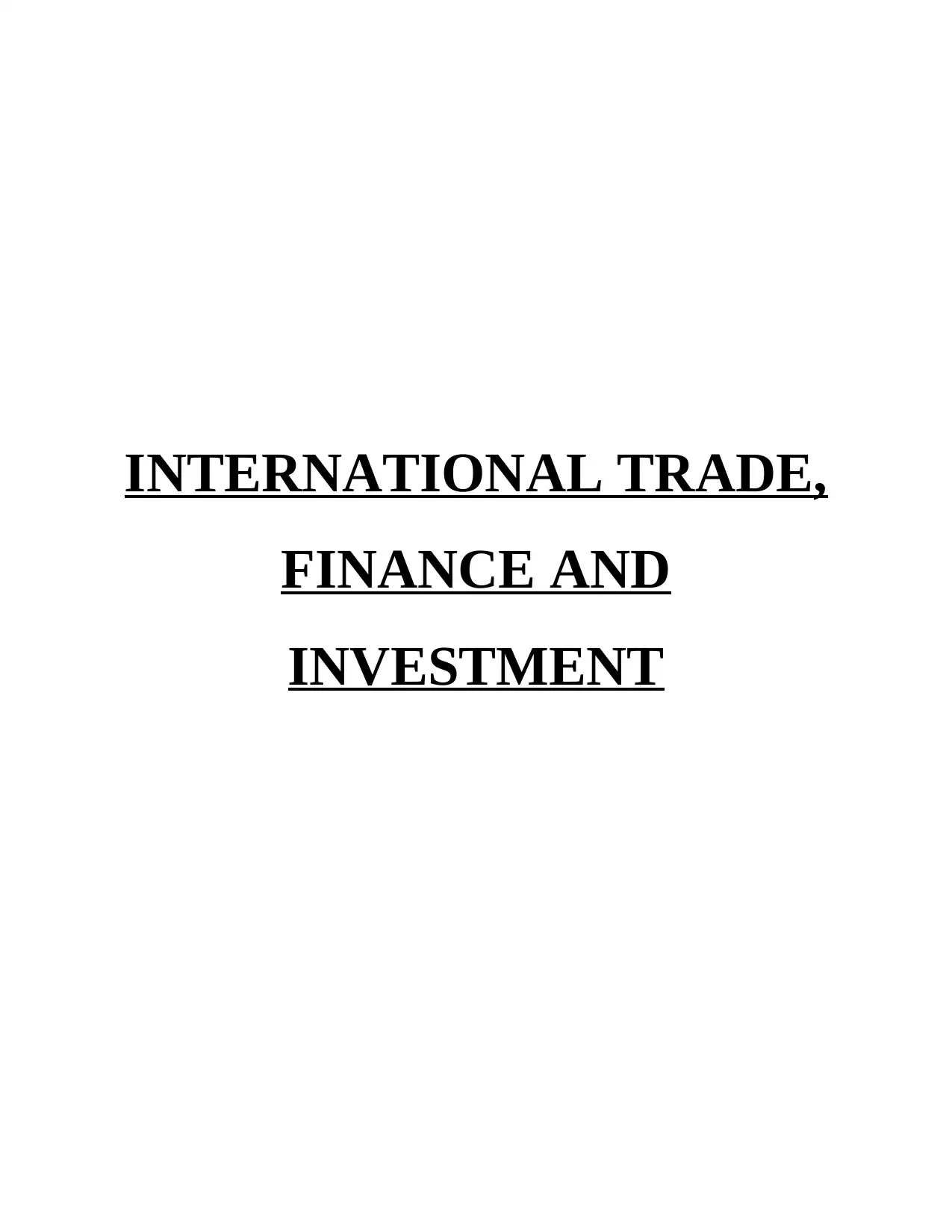
INTERNATIONAL TRADE,
FINANCE AND
INVESTMENT
FINANCE AND
INVESTMENT
Paraphrase This Document
Need a fresh take? Get an instant paraphrase of this document with our AI Paraphraser
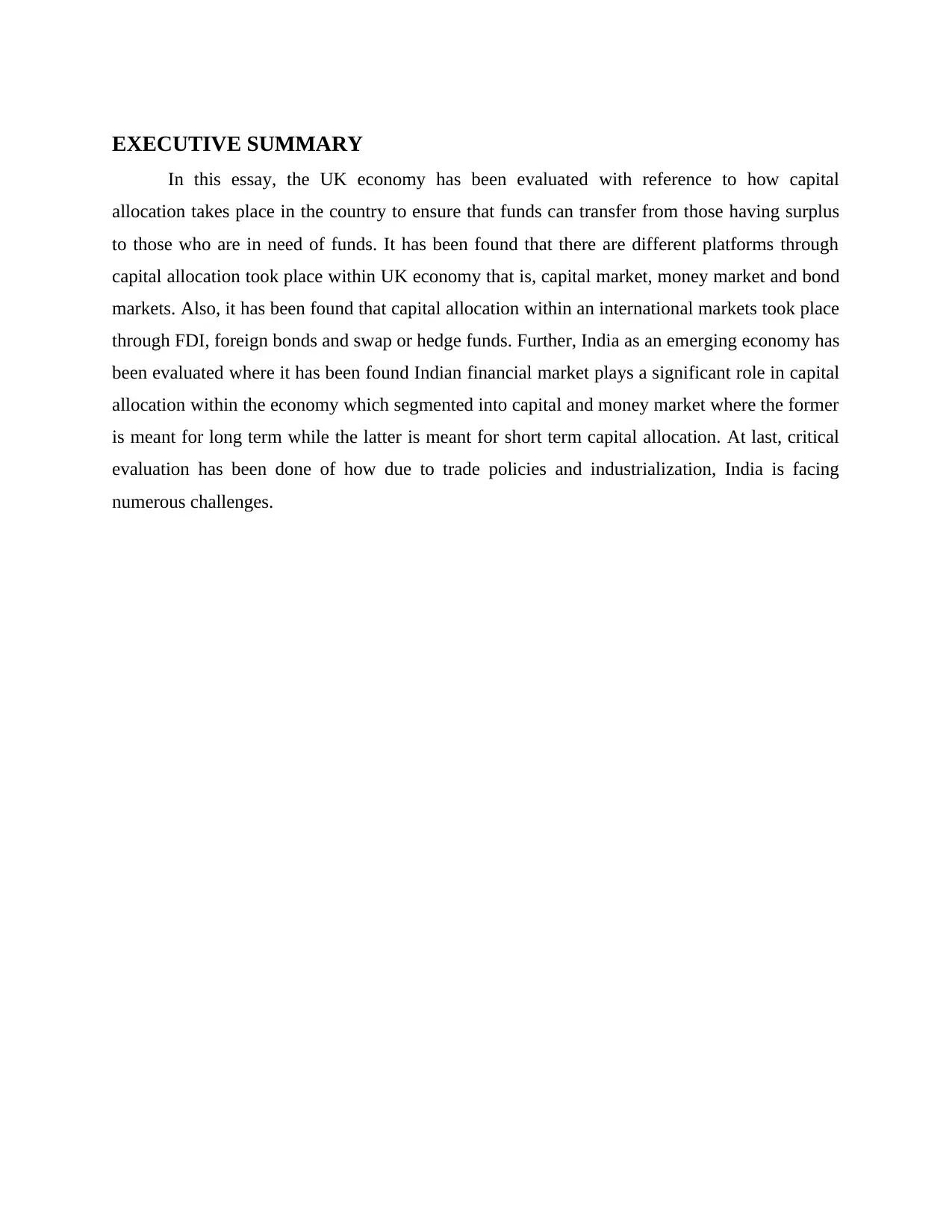
EXECUTIVE SUMMARY
In this essay, the UK economy has been evaluated with reference to how capital
allocation takes place in the country to ensure that funds can transfer from those having surplus
to those who are in need of funds. It has been found that there are different platforms through
capital allocation took place within UK economy that is, capital market, money market and bond
markets. Also, it has been found that capital allocation within an international markets took place
through FDI, foreign bonds and swap or hedge funds. Further, India as an emerging economy has
been evaluated where it has been found Indian financial market plays a significant role in capital
allocation within the economy which segmented into capital and money market where the former
is meant for long term while the latter is meant for short term capital allocation. At last, critical
evaluation has been done of how due to trade policies and industrialization, India is facing
numerous challenges.
In this essay, the UK economy has been evaluated with reference to how capital
allocation takes place in the country to ensure that funds can transfer from those having surplus
to those who are in need of funds. It has been found that there are different platforms through
capital allocation took place within UK economy that is, capital market, money market and bond
markets. Also, it has been found that capital allocation within an international markets took place
through FDI, foreign bonds and swap or hedge funds. Further, India as an emerging economy has
been evaluated where it has been found Indian financial market plays a significant role in capital
allocation within the economy which segmented into capital and money market where the former
is meant for long term while the latter is meant for short term capital allocation. At last, critical
evaluation has been done of how due to trade policies and industrialization, India is facing
numerous challenges.
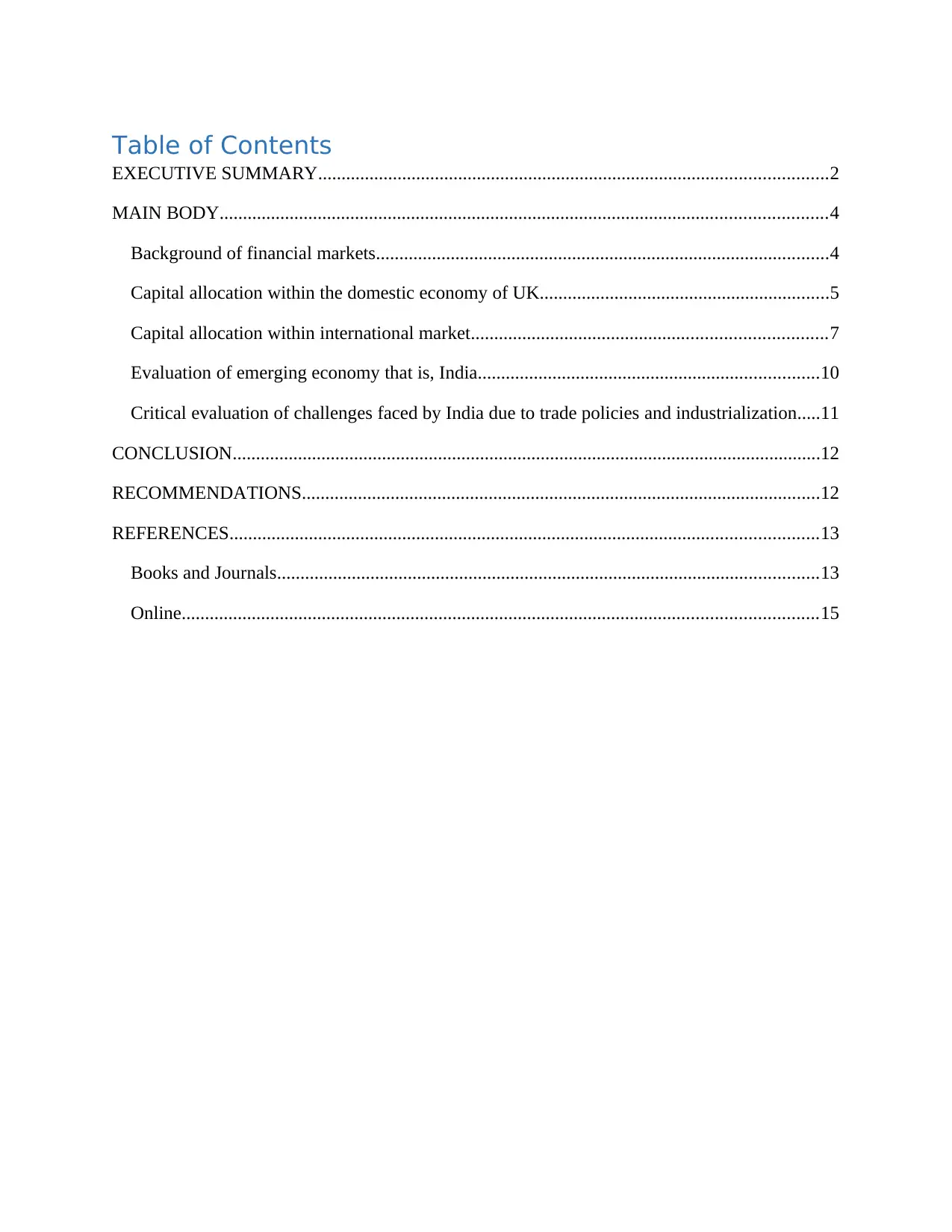
Table of Contents
EXECUTIVE SUMMARY.............................................................................................................2
MAIN BODY..................................................................................................................................4
Background of financial markets.................................................................................................4
Capital allocation within the domestic economy of UK..............................................................5
Capital allocation within international market............................................................................7
Evaluation of emerging economy that is, India.........................................................................10
Critical evaluation of challenges faced by India due to trade policies and industrialization.....11
CONCLUSION..............................................................................................................................12
RECOMMENDATIONS...............................................................................................................12
REFERENCES..............................................................................................................................13
Books and Journals....................................................................................................................13
Online........................................................................................................................................15
EXECUTIVE SUMMARY.............................................................................................................2
MAIN BODY..................................................................................................................................4
Background of financial markets.................................................................................................4
Capital allocation within the domestic economy of UK..............................................................5
Capital allocation within international market............................................................................7
Evaluation of emerging economy that is, India.........................................................................10
Critical evaluation of challenges faced by India due to trade policies and industrialization.....11
CONCLUSION..............................................................................................................................12
RECOMMENDATIONS...............................................................................................................12
REFERENCES..............................................................................................................................13
Books and Journals....................................................................................................................13
Online........................................................................................................................................15
⊘ This is a preview!⊘
Do you want full access?
Subscribe today to unlock all pages.

Trusted by 1+ million students worldwide
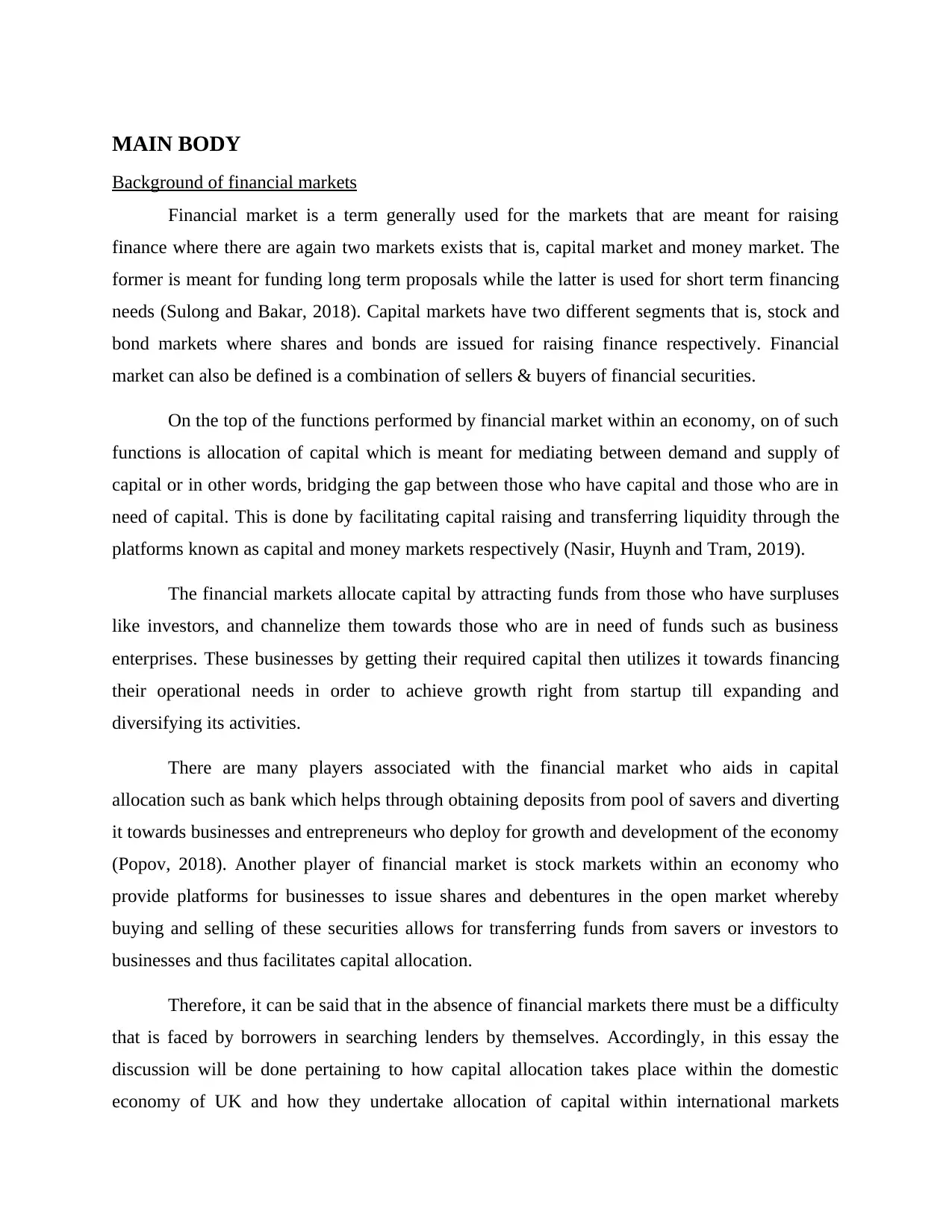
MAIN BODY
Background of financial markets
Financial market is a term generally used for the markets that are meant for raising
finance where there are again two markets exists that is, capital market and money market. The
former is meant for funding long term proposals while the latter is used for short term financing
needs (Sulong and Bakar, 2018). Capital markets have two different segments that is, stock and
bond markets where shares and bonds are issued for raising finance respectively. Financial
market can also be defined is a combination of sellers & buyers of financial securities.
On the top of the functions performed by financial market within an economy, on of such
functions is allocation of capital which is meant for mediating between demand and supply of
capital or in other words, bridging the gap between those who have capital and those who are in
need of capital. This is done by facilitating capital raising and transferring liquidity through the
platforms known as capital and money markets respectively (Nasir, Huynh and Tram, 2019).
The financial markets allocate capital by attracting funds from those who have surpluses
like investors, and channelize them towards those who are in need of funds such as business
enterprises. These businesses by getting their required capital then utilizes it towards financing
their operational needs in order to achieve growth right from startup till expanding and
diversifying its activities.
There are many players associated with the financial market who aids in capital
allocation such as bank which helps through obtaining deposits from pool of savers and diverting
it towards businesses and entrepreneurs who deploy for growth and development of the economy
(Popov, 2018). Another player of financial market is stock markets within an economy who
provide platforms for businesses to issue shares and debentures in the open market whereby
buying and selling of these securities allows for transferring funds from savers or investors to
businesses and thus facilitates capital allocation.
Therefore, it can be said that in the absence of financial markets there must be a difficulty
that is faced by borrowers in searching lenders by themselves. Accordingly, in this essay the
discussion will be done pertaining to how capital allocation takes place within the domestic
economy of UK and how they undertake allocation of capital within international markets
Background of financial markets
Financial market is a term generally used for the markets that are meant for raising
finance where there are again two markets exists that is, capital market and money market. The
former is meant for funding long term proposals while the latter is used for short term financing
needs (Sulong and Bakar, 2018). Capital markets have two different segments that is, stock and
bond markets where shares and bonds are issued for raising finance respectively. Financial
market can also be defined is a combination of sellers & buyers of financial securities.
On the top of the functions performed by financial market within an economy, on of such
functions is allocation of capital which is meant for mediating between demand and supply of
capital or in other words, bridging the gap between those who have capital and those who are in
need of capital. This is done by facilitating capital raising and transferring liquidity through the
platforms known as capital and money markets respectively (Nasir, Huynh and Tram, 2019).
The financial markets allocate capital by attracting funds from those who have surpluses
like investors, and channelize them towards those who are in need of funds such as business
enterprises. These businesses by getting their required capital then utilizes it towards financing
their operational needs in order to achieve growth right from startup till expanding and
diversifying its activities.
There are many players associated with the financial market who aids in capital
allocation such as bank which helps through obtaining deposits from pool of savers and diverting
it towards businesses and entrepreneurs who deploy for growth and development of the economy
(Popov, 2018). Another player of financial market is stock markets within an economy who
provide platforms for businesses to issue shares and debentures in the open market whereby
buying and selling of these securities allows for transferring funds from savers or investors to
businesses and thus facilitates capital allocation.
Therefore, it can be said that in the absence of financial markets there must be a difficulty
that is faced by borrowers in searching lenders by themselves. Accordingly, in this essay the
discussion will be done pertaining to how capital allocation takes place within the domestic
economy of UK and how they undertake allocation of capital within international markets
Paraphrase This Document
Need a fresh take? Get an instant paraphrase of this document with our AI Paraphraser
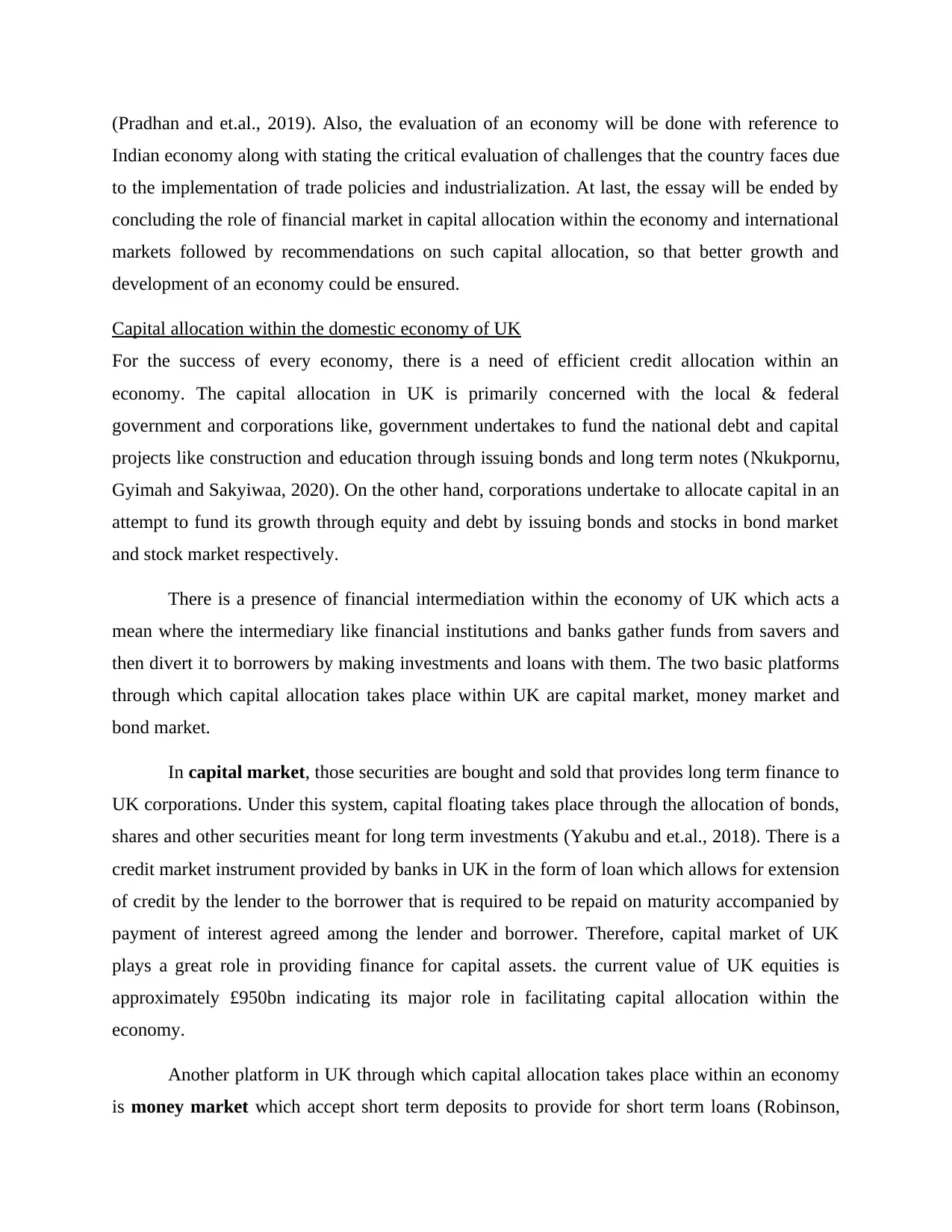
(Pradhan and et.al., 2019). Also, the evaluation of an economy will be done with reference to
Indian economy along with stating the critical evaluation of challenges that the country faces due
to the implementation of trade policies and industrialization. At last, the essay will be ended by
concluding the role of financial market in capital allocation within the economy and international
markets followed by recommendations on such capital allocation, so that better growth and
development of an economy could be ensured.
Capital allocation within the domestic economy of UK
For the success of every economy, there is a need of efficient credit allocation within an
economy. The capital allocation in UK is primarily concerned with the local & federal
government and corporations like, government undertakes to fund the national debt and capital
projects like construction and education through issuing bonds and long term notes (Nkukpornu,
Gyimah and Sakyiwaa, 2020). On the other hand, corporations undertake to allocate capital in an
attempt to fund its growth through equity and debt by issuing bonds and stocks in bond market
and stock market respectively.
There is a presence of financial intermediation within the economy of UK which acts a
mean where the intermediary like financial institutions and banks gather funds from savers and
then divert it to borrowers by making investments and loans with them. The two basic platforms
through which capital allocation takes place within UK are capital market, money market and
bond market.
In capital market, those securities are bought and sold that provides long term finance to
UK corporations. Under this system, capital floating takes place through the allocation of bonds,
shares and other securities meant for long term investments (Yakubu and et.al., 2018). There is a
credit market instrument provided by banks in UK in the form of loan which allows for extension
of credit by the lender to the borrower that is required to be repaid on maturity accompanied by
payment of interest agreed among the lender and borrower. Therefore, capital market of UK
plays a great role in providing finance for capital assets. the current value of UK equities is
approximately £950bn indicating its major role in facilitating capital allocation within the
economy.
Another platform in UK through which capital allocation takes place within an economy
is money market which accept short term deposits to provide for short term loans (Robinson,
Indian economy along with stating the critical evaluation of challenges that the country faces due
to the implementation of trade policies and industrialization. At last, the essay will be ended by
concluding the role of financial market in capital allocation within the economy and international
markets followed by recommendations on such capital allocation, so that better growth and
development of an economy could be ensured.
Capital allocation within the domestic economy of UK
For the success of every economy, there is a need of efficient credit allocation within an
economy. The capital allocation in UK is primarily concerned with the local & federal
government and corporations like, government undertakes to fund the national debt and capital
projects like construction and education through issuing bonds and long term notes (Nkukpornu,
Gyimah and Sakyiwaa, 2020). On the other hand, corporations undertake to allocate capital in an
attempt to fund its growth through equity and debt by issuing bonds and stocks in bond market
and stock market respectively.
There is a presence of financial intermediation within the economy of UK which acts a
mean where the intermediary like financial institutions and banks gather funds from savers and
then divert it to borrowers by making investments and loans with them. The two basic platforms
through which capital allocation takes place within UK are capital market, money market and
bond market.
In capital market, those securities are bought and sold that provides long term finance to
UK corporations. Under this system, capital floating takes place through the allocation of bonds,
shares and other securities meant for long term investments (Yakubu and et.al., 2018). There is a
credit market instrument provided by banks in UK in the form of loan which allows for extension
of credit by the lender to the borrower that is required to be repaid on maturity accompanied by
payment of interest agreed among the lender and borrower. Therefore, capital market of UK
plays a great role in providing finance for capital assets. the current value of UK equities is
approximately £950bn indicating its major role in facilitating capital allocation within the
economy.
Another platform in UK through which capital allocation takes place within an economy
is money market which accept short term deposits to provide for short term loans (Robinson,
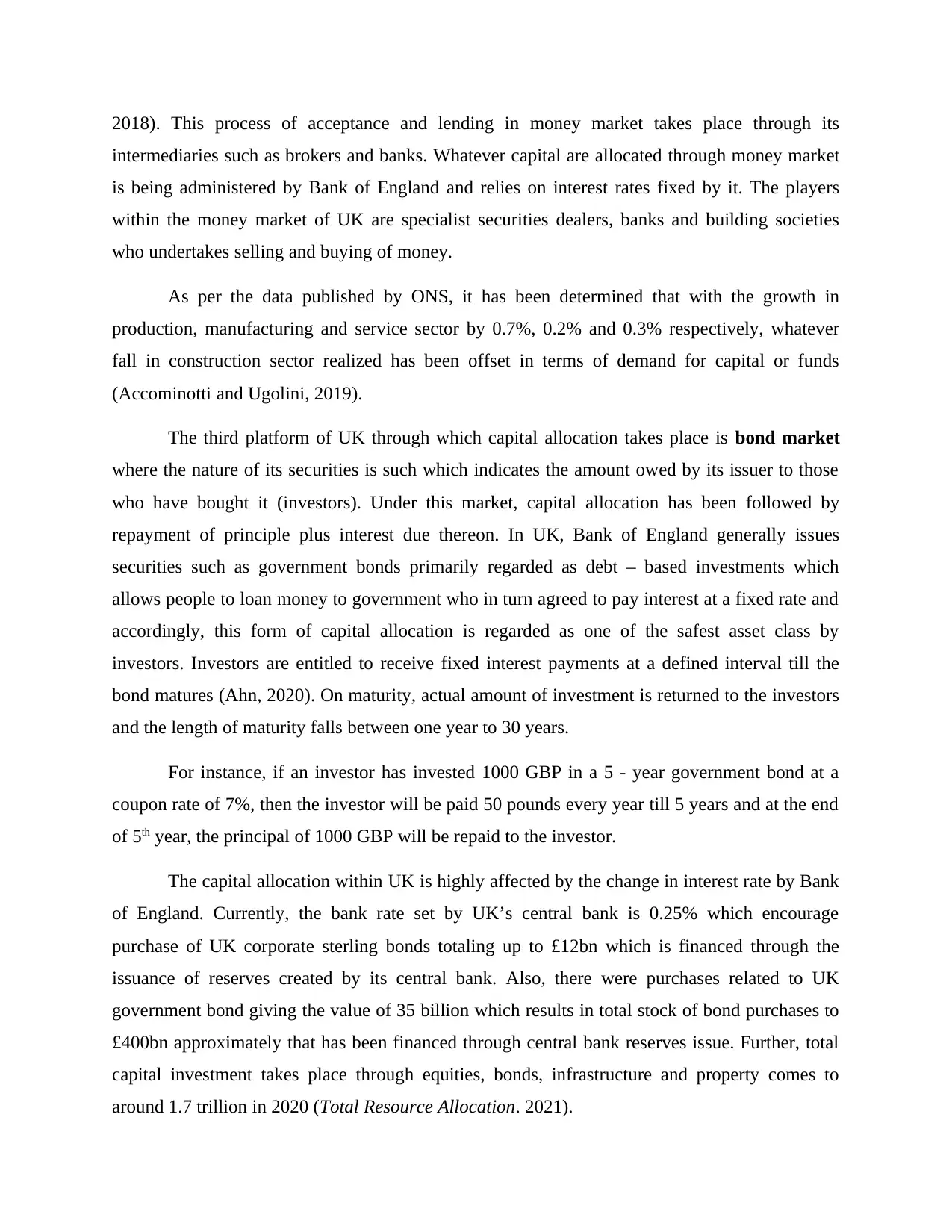
2018). This process of acceptance and lending in money market takes place through its
intermediaries such as brokers and banks. Whatever capital are allocated through money market
is being administered by Bank of England and relies on interest rates fixed by it. The players
within the money market of UK are specialist securities dealers, banks and building societies
who undertakes selling and buying of money.
As per the data published by ONS, it has been determined that with the growth in
production, manufacturing and service sector by 0.7%, 0.2% and 0.3% respectively, whatever
fall in construction sector realized has been offset in terms of demand for capital or funds
(Accominotti and Ugolini, 2019).
The third platform of UK through which capital allocation takes place is bond market
where the nature of its securities is such which indicates the amount owed by its issuer to those
who have bought it (investors). Under this market, capital allocation has been followed by
repayment of principle plus interest due thereon. In UK, Bank of England generally issues
securities such as government bonds primarily regarded as debt – based investments which
allows people to loan money to government who in turn agreed to pay interest at a fixed rate and
accordingly, this form of capital allocation is regarded as one of the safest asset class by
investors. Investors are entitled to receive fixed interest payments at a defined interval till the
bond matures (Ahn, 2020). On maturity, actual amount of investment is returned to the investors
and the length of maturity falls between one year to 30 years.
For instance, if an investor has invested 1000 GBP in a 5 - year government bond at a
coupon rate of 7%, then the investor will be paid 50 pounds every year till 5 years and at the end
of 5th year, the principal of 1000 GBP will be repaid to the investor.
The capital allocation within UK is highly affected by the change in interest rate by Bank
of England. Currently, the bank rate set by UK’s central bank is 0.25% which encourage
purchase of UK corporate sterling bonds totaling up to £12bn which is financed through the
issuance of reserves created by its central bank. Also, there were purchases related to UK
government bond giving the value of 35 billion which results in total stock of bond purchases to
£400bn approximately that has been financed through central bank reserves issue. Further, total
capital investment takes place through equities, bonds, infrastructure and property comes to
around 1.7 trillion in 2020 (Total Resource Allocation. 2021).
intermediaries such as brokers and banks. Whatever capital are allocated through money market
is being administered by Bank of England and relies on interest rates fixed by it. The players
within the money market of UK are specialist securities dealers, banks and building societies
who undertakes selling and buying of money.
As per the data published by ONS, it has been determined that with the growth in
production, manufacturing and service sector by 0.7%, 0.2% and 0.3% respectively, whatever
fall in construction sector realized has been offset in terms of demand for capital or funds
(Accominotti and Ugolini, 2019).
The third platform of UK through which capital allocation takes place is bond market
where the nature of its securities is such which indicates the amount owed by its issuer to those
who have bought it (investors). Under this market, capital allocation has been followed by
repayment of principle plus interest due thereon. In UK, Bank of England generally issues
securities such as government bonds primarily regarded as debt – based investments which
allows people to loan money to government who in turn agreed to pay interest at a fixed rate and
accordingly, this form of capital allocation is regarded as one of the safest asset class by
investors. Investors are entitled to receive fixed interest payments at a defined interval till the
bond matures (Ahn, 2020). On maturity, actual amount of investment is returned to the investors
and the length of maturity falls between one year to 30 years.
For instance, if an investor has invested 1000 GBP in a 5 - year government bond at a
coupon rate of 7%, then the investor will be paid 50 pounds every year till 5 years and at the end
of 5th year, the principal of 1000 GBP will be repaid to the investor.
The capital allocation within UK is highly affected by the change in interest rate by Bank
of England. Currently, the bank rate set by UK’s central bank is 0.25% which encourage
purchase of UK corporate sterling bonds totaling up to £12bn which is financed through the
issuance of reserves created by its central bank. Also, there were purchases related to UK
government bond giving the value of 35 billion which results in total stock of bond purchases to
£400bn approximately that has been financed through central bank reserves issue. Further, total
capital investment takes place through equities, bonds, infrastructure and property comes to
around 1.7 trillion in 2020 (Total Resource Allocation. 2021).
⊘ This is a preview!⊘
Do you want full access?
Subscribe today to unlock all pages.

Trusted by 1+ million students worldwide
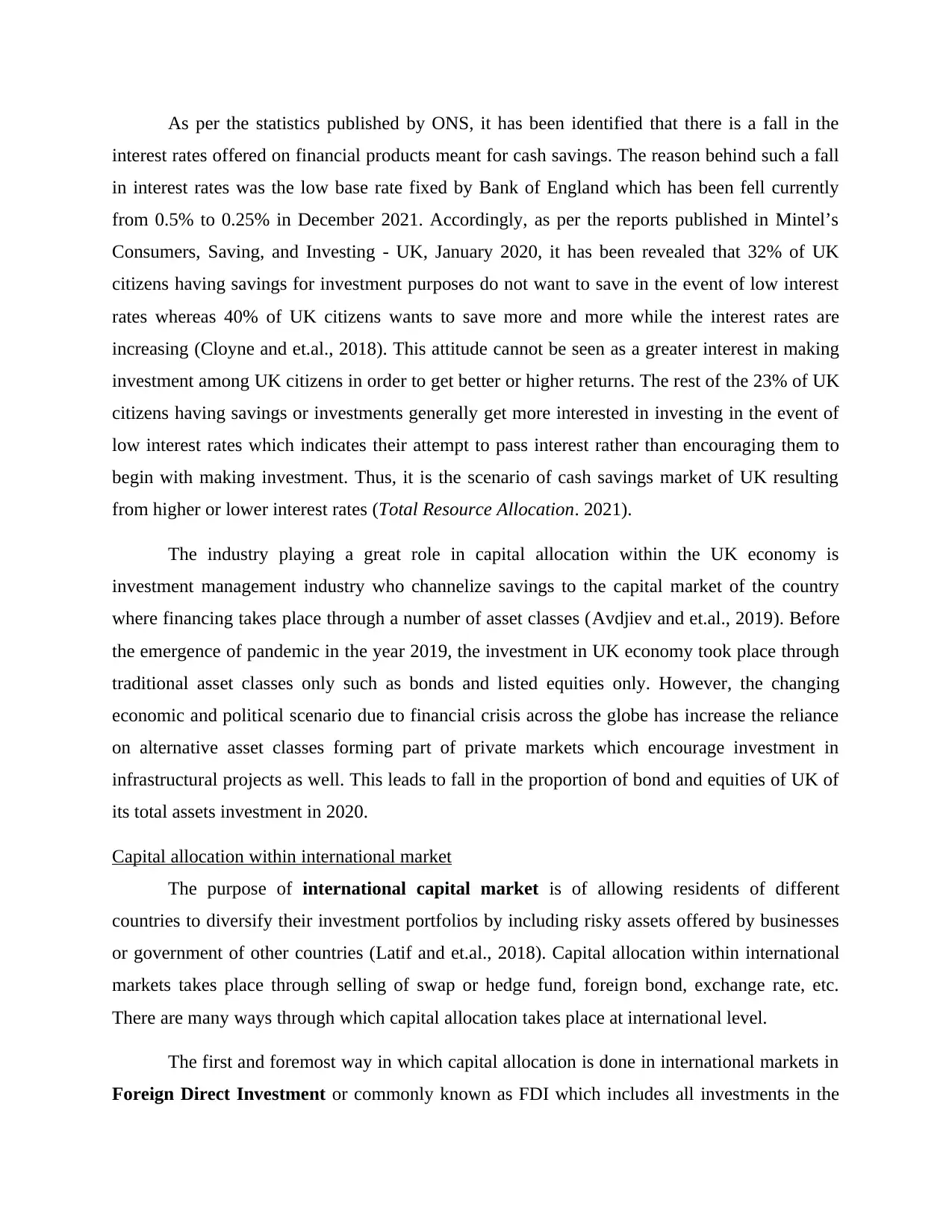
As per the statistics published by ONS, it has been identified that there is a fall in the
interest rates offered on financial products meant for cash savings. The reason behind such a fall
in interest rates was the low base rate fixed by Bank of England which has been fell currently
from 0.5% to 0.25% in December 2021. Accordingly, as per the reports published in Mintel’s
Consumers, Saving, and Investing - UK, January 2020, it has been revealed that 32% of UK
citizens having savings for investment purposes do not want to save in the event of low interest
rates whereas 40% of UK citizens wants to save more and more while the interest rates are
increasing (Cloyne and et.al., 2018). This attitude cannot be seen as a greater interest in making
investment among UK citizens in order to get better or higher returns. The rest of the 23% of UK
citizens having savings or investments generally get more interested in investing in the event of
low interest rates which indicates their attempt to pass interest rather than encouraging them to
begin with making investment. Thus, it is the scenario of cash savings market of UK resulting
from higher or lower interest rates (Total Resource Allocation. 2021).
The industry playing a great role in capital allocation within the UK economy is
investment management industry who channelize savings to the capital market of the country
where financing takes place through a number of asset classes (Avdjiev and et.al., 2019). Before
the emergence of pandemic in the year 2019, the investment in UK economy took place through
traditional asset classes only such as bonds and listed equities only. However, the changing
economic and political scenario due to financial crisis across the globe has increase the reliance
on alternative asset classes forming part of private markets which encourage investment in
infrastructural projects as well. This leads to fall in the proportion of bond and equities of UK of
its total assets investment in 2020.
Capital allocation within international market
The purpose of international capital market is of allowing residents of different
countries to diversify their investment portfolios by including risky assets offered by businesses
or government of other countries (Latif and et.al., 2018). Capital allocation within international
markets takes place through selling of swap or hedge fund, foreign bond, exchange rate, etc.
There are many ways through which capital allocation takes place at international level.
The first and foremost way in which capital allocation is done in international markets in
Foreign Direct Investment or commonly known as FDI which includes all investments in the
interest rates offered on financial products meant for cash savings. The reason behind such a fall
in interest rates was the low base rate fixed by Bank of England which has been fell currently
from 0.5% to 0.25% in December 2021. Accordingly, as per the reports published in Mintel’s
Consumers, Saving, and Investing - UK, January 2020, it has been revealed that 32% of UK
citizens having savings for investment purposes do not want to save in the event of low interest
rates whereas 40% of UK citizens wants to save more and more while the interest rates are
increasing (Cloyne and et.al., 2018). This attitude cannot be seen as a greater interest in making
investment among UK citizens in order to get better or higher returns. The rest of the 23% of UK
citizens having savings or investments generally get more interested in investing in the event of
low interest rates which indicates their attempt to pass interest rather than encouraging them to
begin with making investment. Thus, it is the scenario of cash savings market of UK resulting
from higher or lower interest rates (Total Resource Allocation. 2021).
The industry playing a great role in capital allocation within the UK economy is
investment management industry who channelize savings to the capital market of the country
where financing takes place through a number of asset classes (Avdjiev and et.al., 2019). Before
the emergence of pandemic in the year 2019, the investment in UK economy took place through
traditional asset classes only such as bonds and listed equities only. However, the changing
economic and political scenario due to financial crisis across the globe has increase the reliance
on alternative asset classes forming part of private markets which encourage investment in
infrastructural projects as well. This leads to fall in the proportion of bond and equities of UK of
its total assets investment in 2020.
Capital allocation within international market
The purpose of international capital market is of allowing residents of different
countries to diversify their investment portfolios by including risky assets offered by businesses
or government of other countries (Latif and et.al., 2018). Capital allocation within international
markets takes place through selling of swap or hedge fund, foreign bond, exchange rate, etc.
There are many ways through which capital allocation takes place at international level.
The first and foremost way in which capital allocation is done in international markets in
Foreign Direct Investment or commonly known as FDI which includes all investments in the
Paraphrase This Document
Need a fresh take? Get an instant paraphrase of this document with our AI Paraphraser
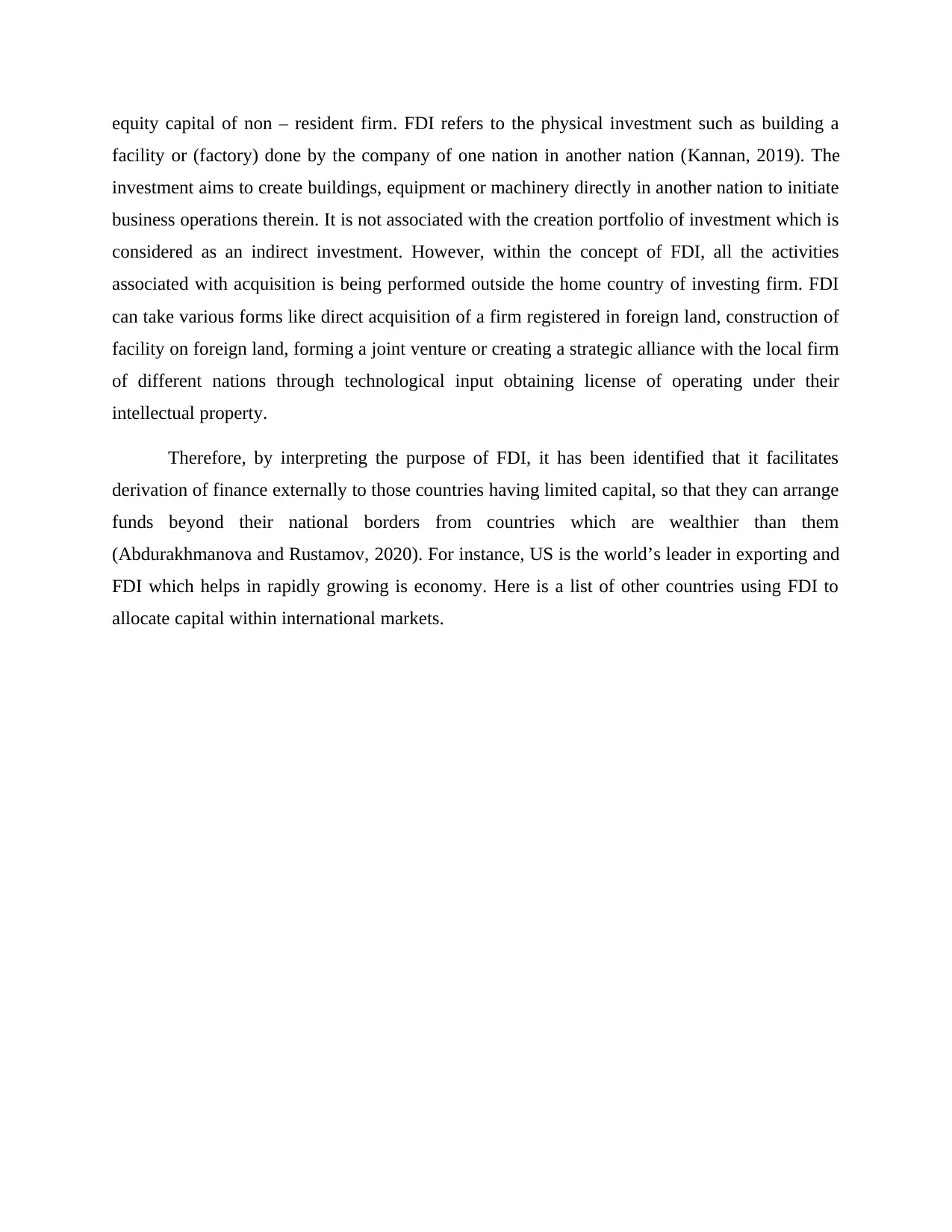
equity capital of non – resident firm. FDI refers to the physical investment such as building a
facility or (factory) done by the company of one nation in another nation (Kannan, 2019). The
investment aims to create buildings, equipment or machinery directly in another nation to initiate
business operations therein. It is not associated with the creation portfolio of investment which is
considered as an indirect investment. However, within the concept of FDI, all the activities
associated with acquisition is being performed outside the home country of investing firm. FDI
can take various forms like direct acquisition of a firm registered in foreign land, construction of
facility on foreign land, forming a joint venture or creating a strategic alliance with the local firm
of different nations through technological input obtaining license of operating under their
intellectual property.
Therefore, by interpreting the purpose of FDI, it has been identified that it facilitates
derivation of finance externally to those countries having limited capital, so that they can arrange
funds beyond their national borders from countries which are wealthier than them
(Abdurakhmanova and Rustamov, 2020). For instance, US is the world’s leader in exporting and
FDI which helps in rapidly growing is economy. Here is a list of other countries using FDI to
allocate capital within international markets.
facility or (factory) done by the company of one nation in another nation (Kannan, 2019). The
investment aims to create buildings, equipment or machinery directly in another nation to initiate
business operations therein. It is not associated with the creation portfolio of investment which is
considered as an indirect investment. However, within the concept of FDI, all the activities
associated with acquisition is being performed outside the home country of investing firm. FDI
can take various forms like direct acquisition of a firm registered in foreign land, construction of
facility on foreign land, forming a joint venture or creating a strategic alliance with the local firm
of different nations through technological input obtaining license of operating under their
intellectual property.
Therefore, by interpreting the purpose of FDI, it has been identified that it facilitates
derivation of finance externally to those countries having limited capital, so that they can arrange
funds beyond their national borders from countries which are wealthier than them
(Abdurakhmanova and Rustamov, 2020). For instance, US is the world’s leader in exporting and
FDI which helps in rapidly growing is economy. Here is a list of other countries using FDI to
allocate capital within international markets.
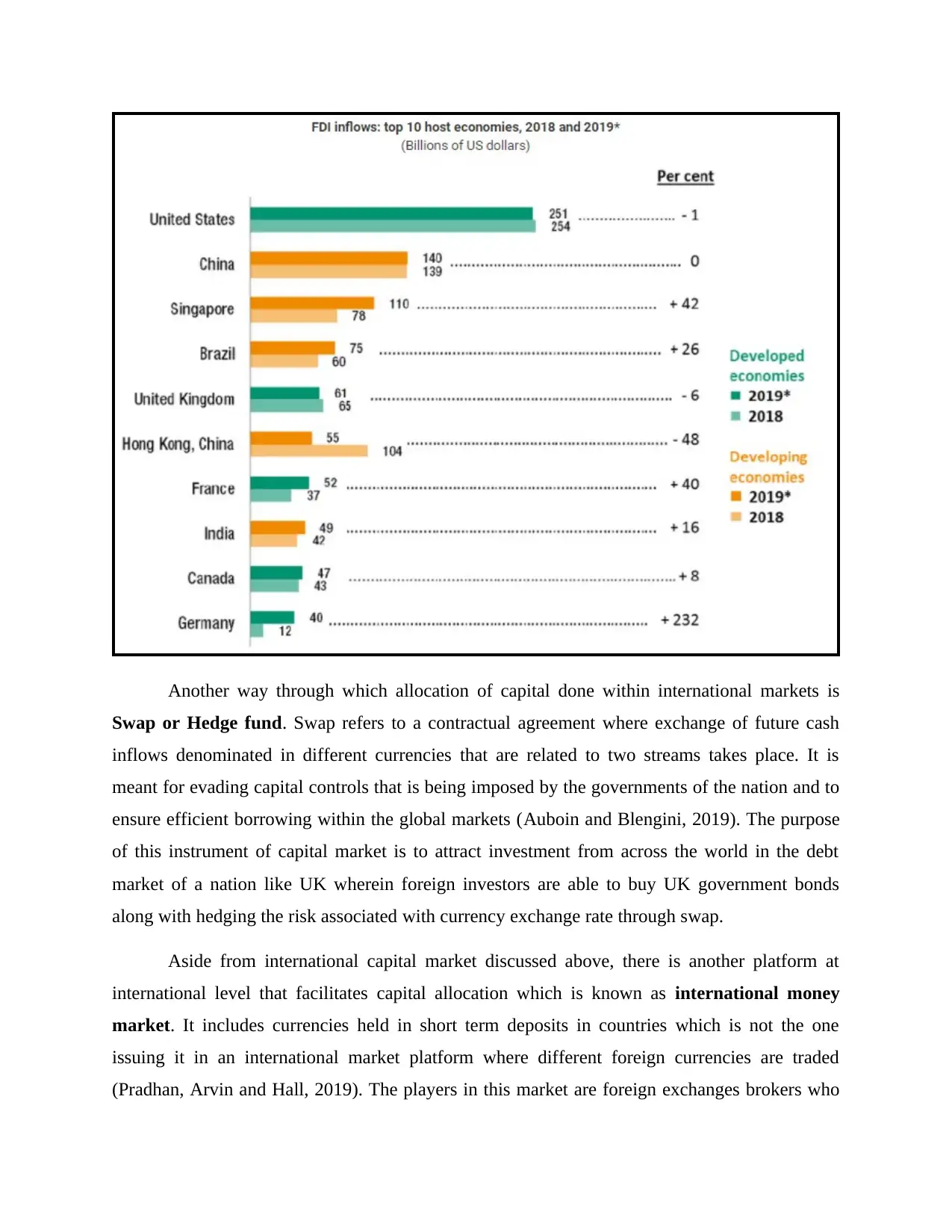
Another way through which allocation of capital done within international markets is
Swap or Hedge fund. Swap refers to a contractual agreement where exchange of future cash
inflows denominated in different currencies that are related to two streams takes place. It is
meant for evading capital controls that is being imposed by the governments of the nation and to
ensure efficient borrowing within the global markets (Auboin and Blengini, 2019). The purpose
of this instrument of capital market is to attract investment from across the world in the debt
market of a nation like UK wherein foreign investors are able to buy UK government bonds
along with hedging the risk associated with currency exchange rate through swap.
Aside from international capital market discussed above, there is another platform at
international level that facilitates capital allocation which is known as international money
market. It includes currencies held in short term deposits in countries which is not the one
issuing it in an international market platform where different foreign currencies are traded
(Pradhan, Arvin and Hall, 2019). The players in this market are foreign exchanges brokers who
Swap or Hedge fund. Swap refers to a contractual agreement where exchange of future cash
inflows denominated in different currencies that are related to two streams takes place. It is
meant for evading capital controls that is being imposed by the governments of the nation and to
ensure efficient borrowing within the global markets (Auboin and Blengini, 2019). The purpose
of this instrument of capital market is to attract investment from across the world in the debt
market of a nation like UK wherein foreign investors are able to buy UK government bonds
along with hedging the risk associated with currency exchange rate through swap.
Aside from international capital market discussed above, there is another platform at
international level that facilitates capital allocation which is known as international money
market. It includes currencies held in short term deposits in countries which is not the one
issuing it in an international market platform where different foreign currencies are traded
(Pradhan, Arvin and Hall, 2019). The players in this market are foreign exchanges brokers who
⊘ This is a preview!⊘
Do you want full access?
Subscribe today to unlock all pages.

Trusted by 1+ million students worldwide
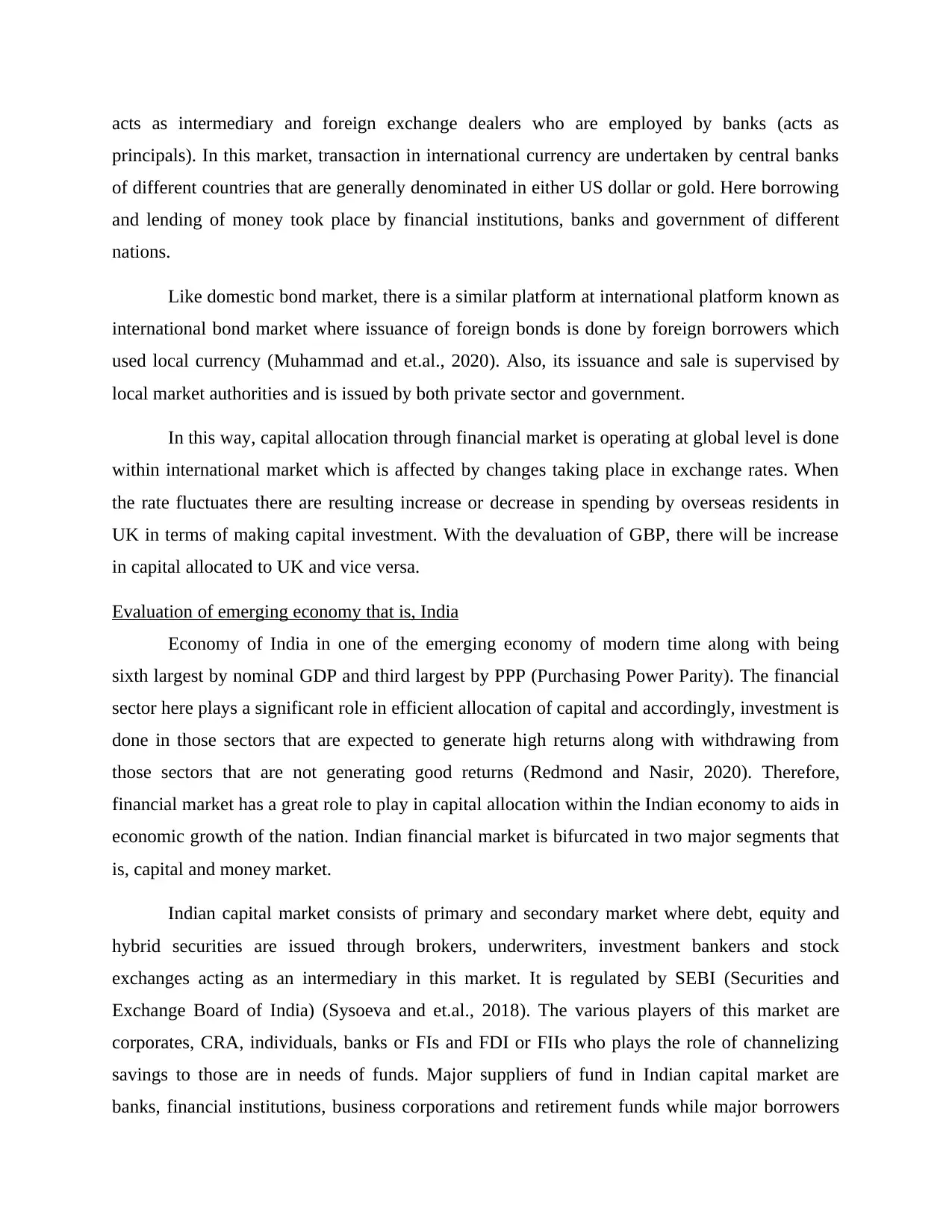
acts as intermediary and foreign exchange dealers who are employed by banks (acts as
principals). In this market, transaction in international currency are undertaken by central banks
of different countries that are generally denominated in either US dollar or gold. Here borrowing
and lending of money took place by financial institutions, banks and government of different
nations.
Like domestic bond market, there is a similar platform at international platform known as
international bond market where issuance of foreign bonds is done by foreign borrowers which
used local currency (Muhammad and et.al., 2020). Also, its issuance and sale is supervised by
local market authorities and is issued by both private sector and government.
In this way, capital allocation through financial market is operating at global level is done
within international market which is affected by changes taking place in exchange rates. When
the rate fluctuates there are resulting increase or decrease in spending by overseas residents in
UK in terms of making capital investment. With the devaluation of GBP, there will be increase
in capital allocated to UK and vice versa.
Evaluation of emerging economy that is, India
Economy of India in one of the emerging economy of modern time along with being
sixth largest by nominal GDP and third largest by PPP (Purchasing Power Parity). The financial
sector here plays a significant role in efficient allocation of capital and accordingly, investment is
done in those sectors that are expected to generate high returns along with withdrawing from
those sectors that are not generating good returns (Redmond and Nasir, 2020). Therefore,
financial market has a great role to play in capital allocation within the Indian economy to aids in
economic growth of the nation. Indian financial market is bifurcated in two major segments that
is, capital and money market.
Indian capital market consists of primary and secondary market where debt, equity and
hybrid securities are issued through brokers, underwriters, investment bankers and stock
exchanges acting as an intermediary in this market. It is regulated by SEBI (Securities and
Exchange Board of India) (Sysoeva and et.al., 2018). The various players of this market are
corporates, CRA, individuals, banks or FIs and FDI or FIIs who plays the role of channelizing
savings to those are in needs of funds. Major suppliers of fund in Indian capital market are
banks, financial institutions, business corporations and retirement funds while major borrowers
principals). In this market, transaction in international currency are undertaken by central banks
of different countries that are generally denominated in either US dollar or gold. Here borrowing
and lending of money took place by financial institutions, banks and government of different
nations.
Like domestic bond market, there is a similar platform at international platform known as
international bond market where issuance of foreign bonds is done by foreign borrowers which
used local currency (Muhammad and et.al., 2020). Also, its issuance and sale is supervised by
local market authorities and is issued by both private sector and government.
In this way, capital allocation through financial market is operating at global level is done
within international market which is affected by changes taking place in exchange rates. When
the rate fluctuates there are resulting increase or decrease in spending by overseas residents in
UK in terms of making capital investment. With the devaluation of GBP, there will be increase
in capital allocated to UK and vice versa.
Evaluation of emerging economy that is, India
Economy of India in one of the emerging economy of modern time along with being
sixth largest by nominal GDP and third largest by PPP (Purchasing Power Parity). The financial
sector here plays a significant role in efficient allocation of capital and accordingly, investment is
done in those sectors that are expected to generate high returns along with withdrawing from
those sectors that are not generating good returns (Redmond and Nasir, 2020). Therefore,
financial market has a great role to play in capital allocation within the Indian economy to aids in
economic growth of the nation. Indian financial market is bifurcated in two major segments that
is, capital and money market.
Indian capital market consists of primary and secondary market where debt, equity and
hybrid securities are issued through brokers, underwriters, investment bankers and stock
exchanges acting as an intermediary in this market. It is regulated by SEBI (Securities and
Exchange Board of India) (Sysoeva and et.al., 2018). The various players of this market are
corporates, CRA, individuals, banks or FIs and FDI or FIIs who plays the role of channelizing
savings to those are in needs of funds. Major suppliers of fund in Indian capital market are
banks, financial institutions, business corporations and retirement funds while major borrowers
Paraphrase This Document
Need a fresh take? Get an instant paraphrase of this document with our AI Paraphraser
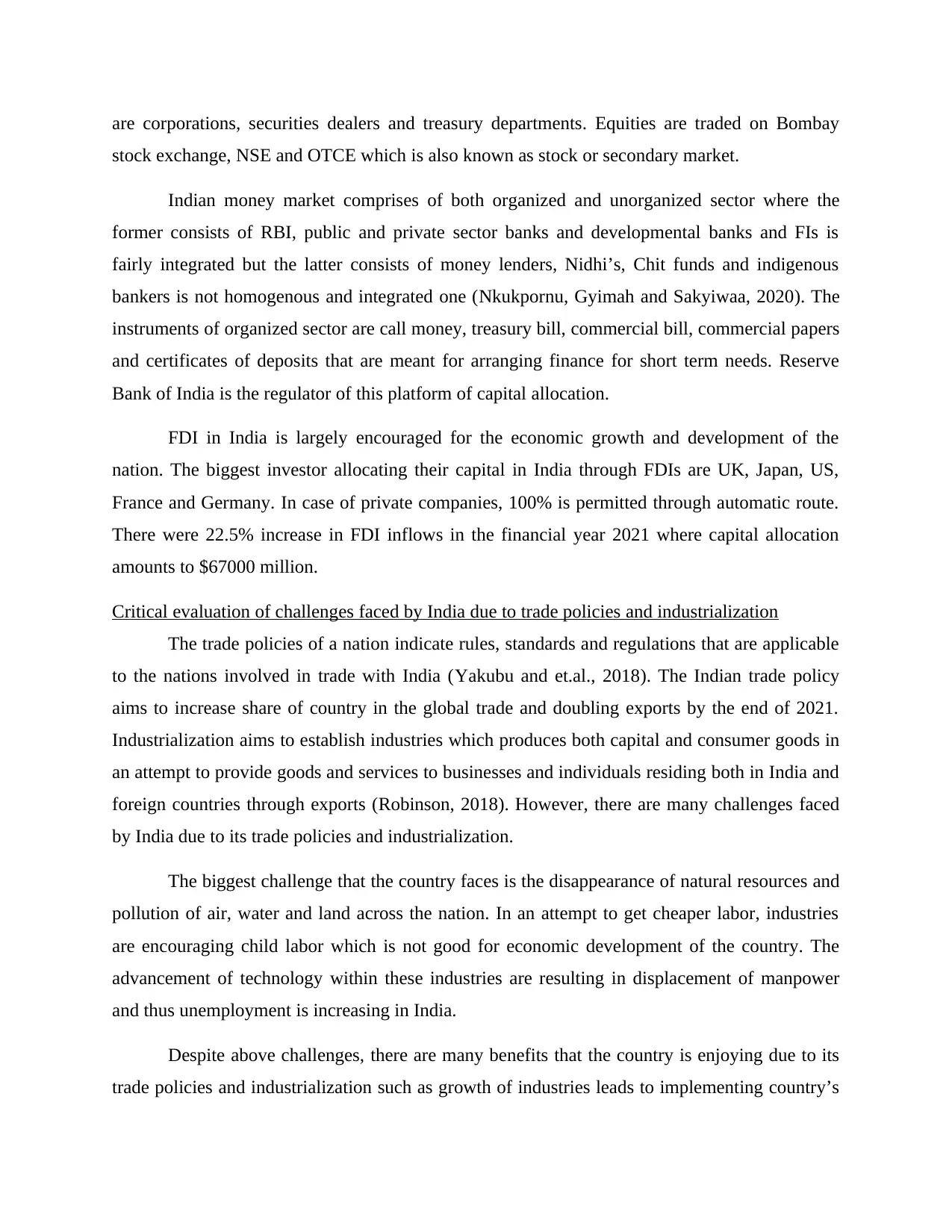
are corporations, securities dealers and treasury departments. Equities are traded on Bombay
stock exchange, NSE and OTCE which is also known as stock or secondary market.
Indian money market comprises of both organized and unorganized sector where the
former consists of RBI, public and private sector banks and developmental banks and FIs is
fairly integrated but the latter consists of money lenders, Nidhi’s, Chit funds and indigenous
bankers is not homogenous and integrated one (Nkukpornu, Gyimah and Sakyiwaa, 2020). The
instruments of organized sector are call money, treasury bill, commercial bill, commercial papers
and certificates of deposits that are meant for arranging finance for short term needs. Reserve
Bank of India is the regulator of this platform of capital allocation.
FDI in India is largely encouraged for the economic growth and development of the
nation. The biggest investor allocating their capital in India through FDIs are UK, Japan, US,
France and Germany. In case of private companies, 100% is permitted through automatic route.
There were 22.5% increase in FDI inflows in the financial year 2021 where capital allocation
amounts to $67000 million.
Critical evaluation of challenges faced by India due to trade policies and industrialization
The trade policies of a nation indicate rules, standards and regulations that are applicable
to the nations involved in trade with India (Yakubu and et.al., 2018). The Indian trade policy
aims to increase share of country in the global trade and doubling exports by the end of 2021.
Industrialization aims to establish industries which produces both capital and consumer goods in
an attempt to provide goods and services to businesses and individuals residing both in India and
foreign countries through exports (Robinson, 2018). However, there are many challenges faced
by India due to its trade policies and industrialization.
The biggest challenge that the country faces is the disappearance of natural resources and
pollution of air, water and land across the nation. In an attempt to get cheaper labor, industries
are encouraging child labor which is not good for economic development of the country. The
advancement of technology within these industries are resulting in displacement of manpower
and thus unemployment is increasing in India.
Despite above challenges, there are many benefits that the country is enjoying due to its
trade policies and industrialization such as growth of industries leads to implementing country’s
stock exchange, NSE and OTCE which is also known as stock or secondary market.
Indian money market comprises of both organized and unorganized sector where the
former consists of RBI, public and private sector banks and developmental banks and FIs is
fairly integrated but the latter consists of money lenders, Nidhi’s, Chit funds and indigenous
bankers is not homogenous and integrated one (Nkukpornu, Gyimah and Sakyiwaa, 2020). The
instruments of organized sector are call money, treasury bill, commercial bill, commercial papers
and certificates of deposits that are meant for arranging finance for short term needs. Reserve
Bank of India is the regulator of this platform of capital allocation.
FDI in India is largely encouraged for the economic growth and development of the
nation. The biggest investor allocating their capital in India through FDIs are UK, Japan, US,
France and Germany. In case of private companies, 100% is permitted through automatic route.
There were 22.5% increase in FDI inflows in the financial year 2021 where capital allocation
amounts to $67000 million.
Critical evaluation of challenges faced by India due to trade policies and industrialization
The trade policies of a nation indicate rules, standards and regulations that are applicable
to the nations involved in trade with India (Yakubu and et.al., 2018). The Indian trade policy
aims to increase share of country in the global trade and doubling exports by the end of 2021.
Industrialization aims to establish industries which produces both capital and consumer goods in
an attempt to provide goods and services to businesses and individuals residing both in India and
foreign countries through exports (Robinson, 2018). However, there are many challenges faced
by India due to its trade policies and industrialization.
The biggest challenge that the country faces is the disappearance of natural resources and
pollution of air, water and land across the nation. In an attempt to get cheaper labor, industries
are encouraging child labor which is not good for economic development of the country. The
advancement of technology within these industries are resulting in displacement of manpower
and thus unemployment is increasing in India.
Despite above challenges, there are many benefits that the country is enjoying due to its
trade policies and industrialization such as growth of industries leads to implementing country’s
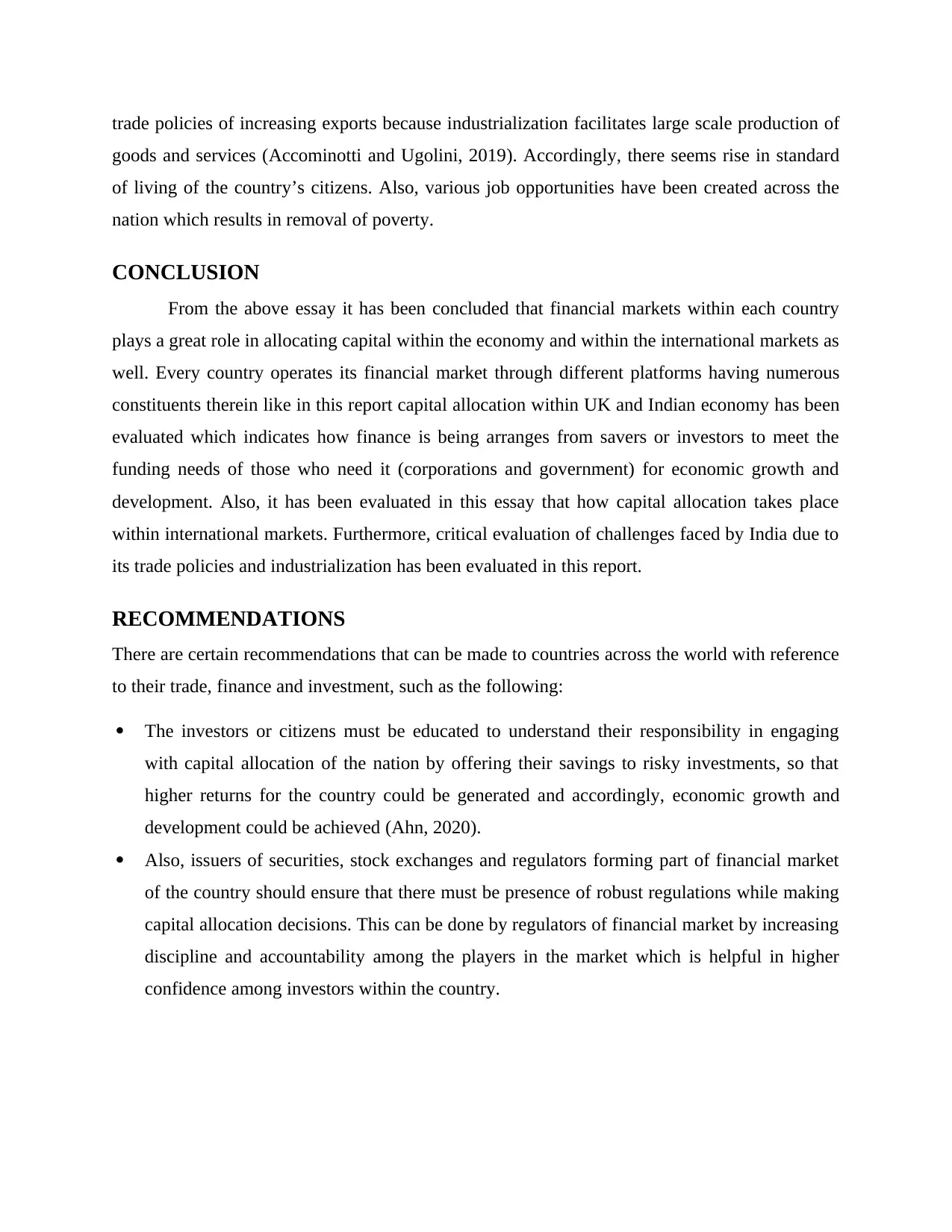
trade policies of increasing exports because industrialization facilitates large scale production of
goods and services (Accominotti and Ugolini, 2019). Accordingly, there seems rise in standard
of living of the country’s citizens. Also, various job opportunities have been created across the
nation which results in removal of poverty.
CONCLUSION
From the above essay it has been concluded that financial markets within each country
plays a great role in allocating capital within the economy and within the international markets as
well. Every country operates its financial market through different platforms having numerous
constituents therein like in this report capital allocation within UK and Indian economy has been
evaluated which indicates how finance is being arranges from savers or investors to meet the
funding needs of those who need it (corporations and government) for economic growth and
development. Also, it has been evaluated in this essay that how capital allocation takes place
within international markets. Furthermore, critical evaluation of challenges faced by India due to
its trade policies and industrialization has been evaluated in this report.
RECOMMENDATIONS
There are certain recommendations that can be made to countries across the world with reference
to their trade, finance and investment, such as the following:
The investors or citizens must be educated to understand their responsibility in engaging
with capital allocation of the nation by offering their savings to risky investments, so that
higher returns for the country could be generated and accordingly, economic growth and
development could be achieved (Ahn, 2020).
Also, issuers of securities, stock exchanges and regulators forming part of financial market
of the country should ensure that there must be presence of robust regulations while making
capital allocation decisions. This can be done by regulators of financial market by increasing
discipline and accountability among the players in the market which is helpful in higher
confidence among investors within the country.
goods and services (Accominotti and Ugolini, 2019). Accordingly, there seems rise in standard
of living of the country’s citizens. Also, various job opportunities have been created across the
nation which results in removal of poverty.
CONCLUSION
From the above essay it has been concluded that financial markets within each country
plays a great role in allocating capital within the economy and within the international markets as
well. Every country operates its financial market through different platforms having numerous
constituents therein like in this report capital allocation within UK and Indian economy has been
evaluated which indicates how finance is being arranges from savers or investors to meet the
funding needs of those who need it (corporations and government) for economic growth and
development. Also, it has been evaluated in this essay that how capital allocation takes place
within international markets. Furthermore, critical evaluation of challenges faced by India due to
its trade policies and industrialization has been evaluated in this report.
RECOMMENDATIONS
There are certain recommendations that can be made to countries across the world with reference
to their trade, finance and investment, such as the following:
The investors or citizens must be educated to understand their responsibility in engaging
with capital allocation of the nation by offering their savings to risky investments, so that
higher returns for the country could be generated and accordingly, economic growth and
development could be achieved (Ahn, 2020).
Also, issuers of securities, stock exchanges and regulators forming part of financial market
of the country should ensure that there must be presence of robust regulations while making
capital allocation decisions. This can be done by regulators of financial market by increasing
discipline and accountability among the players in the market which is helpful in higher
confidence among investors within the country.
⊘ This is a preview!⊘
Do you want full access?
Subscribe today to unlock all pages.

Trusted by 1+ million students worldwide
1 out of 15
Related Documents
Your All-in-One AI-Powered Toolkit for Academic Success.
+13062052269
info@desklib.com
Available 24*7 on WhatsApp / Email
![[object Object]](/_next/static/media/star-bottom.7253800d.svg)
Unlock your academic potential
Copyright © 2020–2025 A2Z Services. All Rights Reserved. Developed and managed by ZUCOL.





